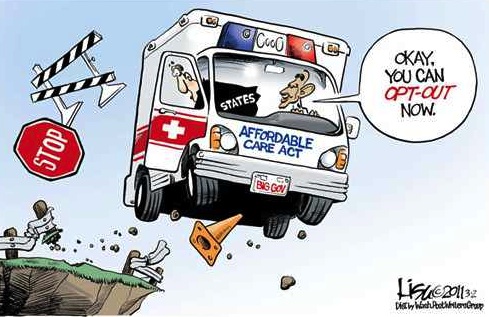Asked at a press conference last week to discuss concerns about whether his administration has the authority to delay Obamacare’s employer mandate, President Obama declined to explain his administration’s authority and instead to simply assert it. But not before casting blame on Republicans. “In a normal political environment,” Obama said, he would have been able to call up House Speaker John Boehner and work out a fix. “We’re not in a normal atmosphere around here when it comes to quote unquote Obamacare. We did have the executive authority to do so.” There you go. Obama says the White House had the authority. Next question?
Actually, wait a minute. Let’s look at this one a little bit more. Did Democrats do anything to help create this abnormal political atmosphere regarding to the health law when they decided to pass a major new entitlement on strict party lines? Supporters of the law typically respond that Republicans wouldn’t have supported any comprehensive Democratic health care overhaul. That may well be true—and it also perhaps a sign that Democrats shouldn’t have passed it, or at least should have known that they would be responsible for making it work, perhaps in the face of ongoing GOP opposition. Relying on cooperation from a fundamentally opposed party seems like poor policy planning.
And anyway, it’s not even true that House Republicans refused to pass legislation lifting the employer mandate. Last month, a majority of House Republicans voted for and passed legislation codifying the administration’s delay of the employer mandate, in conjunction with a bill to similarly delay the individual mandate to purchase insurance. A majority of Democrats, meanwhile, voted against both bills. Obama himself threatened to veto both pieces of legislation should they come to his desk.
Obama also claimed that when the health law opens for enrollment, it will offer individuals who currently do no carry insurance the opportunity to buy plans “at a significantly cheaper rate than what they can get right now on the individual market.” That will likely be the case for some number of older and sicker individuals, but it is certainly not true for everyone who might buy insurance through the exchanges. In many states, younger, healthier individuals will end up either paying a penalty or buying plans that are more expensive than the cheapest plans they can buy on the market today. Obamacare’s defenders sometimes note that, thanks to the law’s benefits rules, plans bought on the exchanges will be more robust than many inexpensive plans are now. For anyone who might be concerned about cost—which, thanks to the mandate requiring people to purchase insurance, could be millions of people—misses the point. More expansive, more expensive coverage is still more expensive.
Obama’s sharpest words at the press conference were reserved for Republicans who wanted to block his health law, a goal he described as the GOP’s “number one priority” and its “holy grail.” In particular, he lambasted Republicans for opposing his plan without a replacement. “There’s not even a pretense now, that they’re going to replace it with something better,” Obama said. Insofar as he means that the GOP is not broadly united around a health reform plan of its own, that is true, and I believe it represents a decades-long failure on the part of Republicans. But the lack of a consensus alternative is not exactly a strong affirmative argument in favor of the president’s health law. The GOP’s mistakes do not justify the president’s bad law.
. . . . . . . . . . . . . .
Peter Suderman Peter Suderman is a senior editor at Reason magazine and Reason.com.
